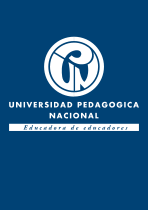Hacia una pedagogía de la diversidad o la exigencia de repensar el carácter inclusivo de la escuela.

Citación
Fecha
2008-10-25Autor
López Martín, Ramón
Enlace al recurso
https://revistas.pedagogica.edu.co/index.php/PYS/article/view/6873Palabras claves
Pedagogía de la diversidad
Educación intercultural
Escuela inclusiva
Ciudadanía
Aprendizaje social
Valores democráticos
Convivencia escolar
Keyword
Pedagogy of the diversityEducation intercultural
Inclusive school
Citizenship
Social learning
Democratic values
School coexistence
Metadatos
Mostrar el registro completo del ítemResumen
Desde la perspectiva de entender la educación de la ciudadanía como un instrumento al servicio de la convivencia democrática, este artículo se aproxima al análisis de uno de los desafíos educativos fundamentales de las sociedades del tercer milenio: la búsqueda de un adecuado equilibrio entre la sólida formación de las identidades y la gestión democrática de la diversidad. La realidad pluricultural y compleja de las sociedades actuales exige de los profesionales de la educación una reflexión fundamentada sobre los principios básicos de la llamada "pedagogía de la diversidad" y repensar aquellos parámetros de cambio que conviertan la escuela en un escenario de inclusión. El aprendizaje de los valores democráticos de igualdad, libertad, justicia, pluralismo cultural, tolerancia, solidaridad o respeto a la diferencia, se presenta como la herramienta más poderosa para la integración escolar y social de toda la ciudadanía, en la ansiada defensa de una sociedad pacífica y correctamente cohesionada. Una vez más, en este contexto, la escuela debe ser un taller idóneo para el ensayo y aprendizaje de la convivencia ciudadana.
Abstract
From the perspective of understanding the education of the citizenship as an instrument to the service of the democratic coexistence, this article approaches the analysis of one of the fundamental educational challenges of the societies of the third millennium: the search of an adequate balance among the solid formation of the identities and the democratic management of the diversity. The pluricultural and complex reality of the present societies requires from the professionals in education a reflection founded upon the basic principles of the so called "pedagogy of the diversity" and to think over those parameters of change that would transform the school into a place of inclusion. The learning of the democratic values of equality, liberty, justice, cultural pluralism, tolerance, solidarity or respect to the difference, is presented as the most powerful tool for the social and educational integration of all the citizens, in the hopped-for defense of a peaceful and cohesive society. Once again, in this context, the school should be a suitable workshop for the practice and learning of the coexistence as citizens.
Editorial
Editorial Universidad Pedagógica Nacional
Fuente
Colecciones
- Pedagogía y Saberes [660]
